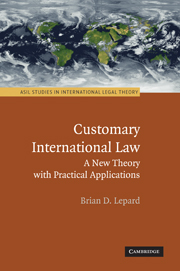Book contents
- Frontmatter
- Contents
- Figures
- Acknowledgments
- Cases
- PART ONE THE ENIGMAS OF CUSTOMARY INTERNATIONAL LAW
- PART TWO FOUNDATIONS OF A NEW THEORY OF CUSTOMARY INTERNATIONAL LAW
- PART THREE RESOLVING THE CONCEPTUAL ENIGMAS OF CUSTOMARY INTERNATIONAL LAW
- PART FOUR RESOLVING THE PRACTICAL ENIGMAS OF CUSTOMARY INTERNATIONAL LAW
- PART FIVE SOME APPLICATIONS OF THE THEORY
- 21 International Rules on Allocating Income for Tax Purposes
- 22 International Human Rights Law in General
- 23 Determining the Customary Law Status of Specific Human Rights
- 24 The Right to Change One's Religion or Belief
- PART SIX THE FUTURE OF CUSTOMARY INTERNATIONAL LAW
- Bibliography
- Index
22 - International Human Rights Law in General
Published online by Cambridge University Press: 05 June 2012
- Frontmatter
- Contents
- Figures
- Acknowledgments
- Cases
- PART ONE THE ENIGMAS OF CUSTOMARY INTERNATIONAL LAW
- PART TWO FOUNDATIONS OF A NEW THEORY OF CUSTOMARY INTERNATIONAL LAW
- PART THREE RESOLVING THE CONCEPTUAL ENIGMAS OF CUSTOMARY INTERNATIONAL LAW
- PART FOUR RESOLVING THE PRACTICAL ENIGMAS OF CUSTOMARY INTERNATIONAL LAW
- PART FIVE SOME APPLICATIONS OF THE THEORY
- 21 International Rules on Allocating Income for Tax Purposes
- 22 International Human Rights Law in General
- 23 Determining the Customary Law Status of Specific Human Rights
- 24 The Right to Change One's Religion or Belief
- PART SIX THE FUTURE OF CUSTOMARY INTERNATIONAL LAW
- Bibliography
- Index
Summary
INTRODUCTION
I now examine a very different problem – whether and to what extent human rights standards articulated in international declarations and treaties form part of customary international law under the definition I propose. In this chapter I first offer a brief history of international human rights law. I then examine the historical debates on the authority of international human rights law, and in particular the human rights provisions of the United Nations (U.N.) Charter, the 1948 Universal Declaration of Human Rights, and the 1966 International Covenant on Civil and Political Rights (ICCPR). Finally, I analyze generally the role of each of these instruments as evidence of opinio juris. In the next chapter I examine how to determine whether particular rights are part of customary international law, whether states can exempt themselves from an obligation to honor these rights through persistent objection to them, and whether and when rights qualifying as customary law should be treated as jus cogens or erga omnes norms.
A BRIEF HISTORY OF INTERNATIONAL HUMAN RIGHTS LAW
A signal victory of civilization during the bloody twentieth century was the assertion, in international law, of the existence of fundamental human rights and of an obligation of states to safeguard them. The U.N. Charter announced in 1945 that one of its primary purposes was to “reaffirm faith in fundamental human rights, in the dignity and worth of the human beings, [and] in the equal rights of men and women.”
- Type
- Chapter
- Information
- Customary International LawA New Theory with Practical Applications, pp. 306 - 330Publisher: Cambridge University PressPrint publication year: 2010



